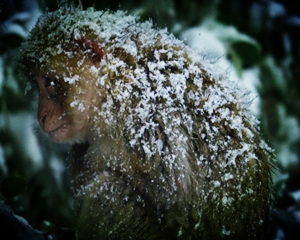This is the cedar forest of the Atlas Mountains, in North Africa.
这里是非洲北部阿特拉斯山脉的雪松林。
These Barbary macaques enjoyed a summer of plenty, but now they're paying the price.
这群地中海猕猴享受了丰收的夏季,但好景不常。
Winter here can be brutal. In some years, over half the group perish.
这里的冬季刺骨严寒。某些年,半数以上的猕猴死在了冬季。
But in this macaque society, the more social the monkey, the more likely it is to survive.
在这样一个社会,猕猴的社交能力越强,生存几率便越大。
Keeping warm by huddling can make all the difference. But they can't huddle all day.
抱团取暖效果显着。但也不能一直抱在一起。
They must, eventually, break apart to feed. They spread out, searching for food.
它们为了觅食,不得不从温暖中抽身。猕猴四散分开,寻找食物。
But each night, the group return to huddle in the cedar trees.
但到了晚上,猕猴群便会回到雪松树上挤成一团。

No-one wants to be left out. Especially the infants.
谁也不想被落下。尤其是猕猴幼崽。
This baby, somehow, has got separated. He must get back to the life-saving warmth of the huddle, and soon.
不知怎的,这只猕猴幼崽跟大部队分散了。它必须回到温暖的怀抱中,以维系生命,而且必须尽快。
But there is an obstacle. A grumpy male is giving the baby a rather cold shoulder.
然而有一个问题。一只脾气暴躁的雄猕猴对猕猴幼崽相当冷淡。
Maybe a more subtle approach. The male decides to leave. At last, an enthusiastic reception.
换一种更隐蔽的方式。雄猕猴决定离开。终于,得到了热情的欢迎。
The male has had less luck. It could be a long night.
雄弥猴则运气不佳。将是漫漫长夜等着它。
Huddling might seem a simple expression of affection, but among these macaques it's essential for survival. And not just here.
抱团似乎是一种表达情感的简单方式,但对于这些地中海猕猴来说,这对于生存至关重要。而这样的行为并非绝无仅有。












